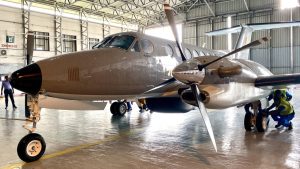Sri Lanka recently received two advanced surveillance aircraft from the United States and Australia, marking a significant step in deepening ties with Western defense partners as well as safeguarding the country’s maritime interests. These gifts represent a long-term strategic collaboration, initially planned by the previous administration and now realized under President Anura Kumara Dissanayake’s leadership.
This is a milestone for Sri Lanka’s emerging role as a key player in ensuring stability across the Indian Ocean.
On October 10, U.S. Pacific Fleet Commander Admiral Steve Koehler ceremoniously handed over a Beechcraft King Air 360ER to the Sri Lanka Air Force (SLAF) at Katunayake Air Force Base. The ceremony was attended by top officials, including U.S. Ambassador Julie Chung and Sri Lanka’s Defense Secretary Air Vice Marshal Sampath Thuyacontha (Retd).
The induction of the new aircraft equips Sri Lanka’s military with an advanced, state-of-the-art surveillance tool. The King Air 360ER will enable Sri Lanka to monitor its waters, counter maritime threats, and safeguard essential trade routes. “As partners, the United States shares Sri Lanka’s vision that security is a collective responsibility, as our seas connect us,” Chung said at the ceremony. She emphasized that shared security across these waters is crucial to supporting the prosperity and peace both Sri Lanka and the United States value.
Following closely on the heels of U.S. support, Australia further strengthened Sri Lanka’s maritime capabilities on October 24, with the arrival of a former Royal Australian Air Force King Air 350. Equipped with intelligence, surveillance, and reconnaissance (ISR) capabilities, the King Air 350 will operate alongside its U.S. counterpart, providing the SLAF with greater flexibility and control over its shores. With Australia providing support for a year, this aircraft enhances Sri Lanka’s capacity to monitor its maritime surroundings and respond to humanitarian missions – a critical responsibility as a key player in regional coastal security.
Koehler captured the spirit of these collaborations, saying, “Today’s ceremony is about much more than one aircraft; it’s about our two nations’ commitment to protecting sovereignty and addressing complex maritime challenges together.” The gifts of these aircraft are not just about modernizing defense capabilities but reflect how the United States and Australia view Sri Lanka: as a critical regional point in terms of defense and as a protector of peace in a region faced with pressing maritime threats.
For Sri Lanka, the new aircraft offer much more than surveillance. They are essential tools to counter the surge in maritime threats and challenges the country has faced for years, including illegal, unreported, and unregulated (IUU) fishing, smuggling, and human trafficking. In recent years, these threats have escalated, including poaching by unauthorized vessels, drug trafficking, and piracy along one of the world’s busiest shipping lanes.
Positioned in Trincomalee, the King Airs will support Maritime Squadron 3, enabling Sri Lanka to monitor vast ocean areas and address threats beyond its immediate shores.
Dissanayake’s administration has made a promising start with the arrival of Western defense support. Interestingly, before his election, Dissanayake faced criticism for lacking a global network, with skeptics claiming he would be unable to establish meaningful connections with major powers that could bring in foreign support. This recent collaboration stands as a compelling counterpoint to those doubts, demonstrating his administration’s ability to foster significant alliances that benefit Sri Lanka’s security and standing. With a seasoned and highly decorated former SLAF pilot as the secretary of defense, this collaboration now holds the potential for even stronger ties.
For Sri Lanka, the King Airs are more than defense assets; they are an indicator of the country’s growing importance in the Indo-Pacific. With new capabilities to protect its waters and contribute to regional stability, Sri Lanka is emerging as a leader in fostering peace and prosperity across the Indian Ocean.

































